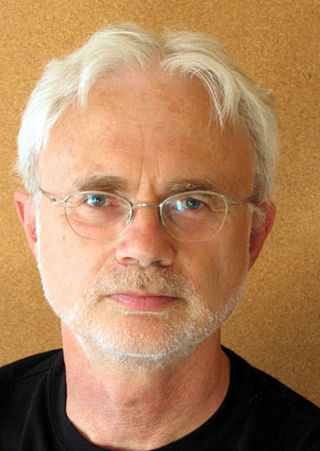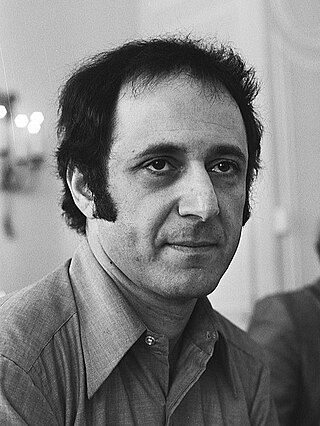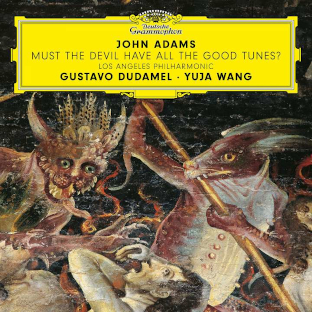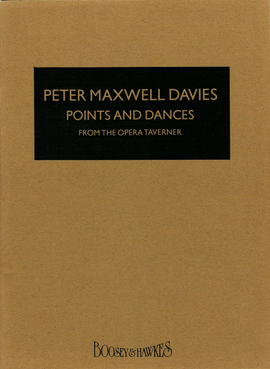
John Coolidge Adams is an American composer and conductor. Among the most regularly performed composers of contemporary classical music, he is particularly noted for his operas, many of which center around historical events. Apart from opera, his oeuvre includes orchestral, concertante, vocal, choral, chamber, electroacoustic, and piano music.

Stephen Michael Reich is an American composer who is known for his contribution to the development of minimal music in the mid to late 1960s. Reich's work is marked by its use of repetitive figures, slow harmonic rhythm, and canons. Reich describes this concept in his essay, "Music as a Gradual Process", by stating, "I am interested in perceptible processes. I want to be able to hear the process happening throughout the sounding music." For example, his early works experiment with phase shifting, in which one or more repeated phrases plays slower or faster than the others, causing it to go "out of phase." This creates new musical patterns in a perceptible flow.

The Violin Concerto by the American composer John Adams was written in 1993. Its premiere was on January 19, 1994, by Jorja Fleezanis with the Minnesota Orchestra, conducted by Edo de Waart, at the Ordway Music Theater, Saint Paul, Minnesota.
Music for 18 Musicians is a work of minimalist music composed by Steve Reich during 1974–1976. Its world premiere was on April 24, 1976, at The Town Hall in the Midtown Manhattan Theater District. Following this, a recording of the piece was released on the ECM New Series in 1978. The 1998 recording for Nonesuch Records won the Grammy Award for Best Small Ensemble Performance.

On the Transmigration of Souls is a composition for orchestra, chorus, children's choir, and pre-recorded tape by the American composer John Adams. It was commissioned by the New York Philharmonic and Lincoln Center's Great Performers shortly after the September 11 terrorist attacks of 2001. Adams began writing the piece in late January 2002, and the music was premiered by the New York Philharmonic on September 19, 2002, at Avery Fisher Hall. The work is composed in a single movement and has a duration of approximately 25 minutes. Pre-recorded voices, increasingly distorted, list the names of some of the victims, followed by the word “Missing” after each name. The work's sheet music is published by Boosey & Hawkes.

City Life is a minimalist composition by Steve Reich written in 1995. The work was commissioned by Ensemble Modern, the London Sinfonietta, and the Ensemble Intercontemporain. It premiered in March 1995 and was recorded on the Nonesuch label in 1996.
Century Rolls is a piano concerto by the American composer John Adams. Commissioned by Emanuel Ax, the work dates from 1997. Ax was the soloist in the concerto's premiere on September 25, 1997 in Cleveland, Ohio, with Christoph von Dohnányi conducting The Cleveland Orchestra. Ax, von Dohnányi and The Cleveland Orchestra made the first commercial recording of the concerto, for Nonesuch. Adams himself conducted the UK premiere on 1 November 1998, again with Ax as the piano soloist.

Steve Reich and Musicians, sometimes credited as the Steve Reich Ensemble, is a musical ensemble founded and led by the American composer Steve Reich. The group has premiered and performed many of Reich's works both nationally and internationally. In 1999, Reich received a Grammy Award for "Best Small Ensemble Performance " for the ensemble's performance of Music for 18 Musicians.

El Niño is an opera-oratorio by the contemporary American composer John Adams. It was premiered on December 15, 2000, at the Théâtre du Châtelet in Paris by soloists Dawn Upshaw, Lorraine Hunt Lieberson, and Willard White, the vocal ensemble Theatre of Voices, the London Voices, La Maîtrise de Paris, and the Deutsches Symphonie-Orchester Berlin, with Kent Nagano conducting. It has been performed on a number of occasions since, and has been broadcast on BBC Television.

"Onward, Christian Soldiers" is a 19th-century English hymn. The words were written by Sabine Baring-Gould in 1865, and the music was composed by Arthur Sullivan in 1871. Sullivan named the tune "St Gertrude," after the wife of his friend Ernest Clay Ker Seymer, at whose country home he composed the tune. The Salvation Army adopted the hymn as its favoured processional. The piece became Sullivan's most popular hymn. The hymn's theme is taken from references in the New Testament to the Christian being a soldier for Christ, for example II Timothy 2:3 (KJV): "Thou therefore endure hardness, as a good soldier of Jesus Christ."
The shorthand for the instrumentation of a symphony orchestra is used to outline which and how many instruments, especially wind instruments, are called for in a given piece of music. The shorthand is ordered in the same fashion as the parts of the individual instruments in the score.
The Dharma at Big Sur is a composition for solo electric violin and orchestra by the American composer John Adams. The piece calls for some instruments to use just intonation, a tuning system in which intervals sound pure, rather than equal temperament, the common Western tuning system in which all intervals except the octave are slightly impure. The piece was composed in 2003 for the opening of Walt Disney Concert Hall in Los Angeles and was conducted by Esa-Pekka Salonen. The electric violin solo was written for violinist Tracy Silverman.
WTC 9/11 is a composition by Steve Reich for string quartet written in 2009–2010 which premiered on March 19, 2011 at Duke University. The piece was written for the Kronos Quartet, who performed the premiere, and was co-commissioned by Barbican Centre, Carnegie Hall, Duke University, the University of Illinois at Urbana–Champaign, the Philharmonic Society of Orange County, the Phyllis C. Wattis Foundation, Chamber Music America and the National Endowment for the Arts. The piece is approximately fifteen minutes long, and draws inspiration from the events of September 11, 2001. In 2019, writers of The Guardian ranked it the 17th greatest work of art music since 2000.
My Father Knew Charles Ives is an orchestral triptych by the American composer John Adams. The work was commissioned by the San Francisco Symphony. It was first performed by the San Francisco Symphony under the direction of Michael Tilson Thomas at the Louise M. Davies Symphony Hall on April 30, 2003.
Chamber Symphony is a 1992 composition for a 15-member chamber orchestra by American composer John Adams, inspired by Arnold Schoenberg's Chamber Symphony No. 1, Op. 9. It is a three-movement work that takes about 23 minutes to perform.
Scheherazade.2 is a dramatic symphony for solo violin and orchestra by the American composer John Adams. The work was jointly commissioned by the New York Philharmonic, the Concertgebouw & the Royal Concertgebouw Orchestra, and the Sydney Symphony Orchestra. It was written specifically for the violinist Leila Josefowicz, who performed its world premiere with the New York Philharmonic under Alan Gilbert at Avery Fisher Hall on March 26, 2015.

Must the Devil Have All the Good Tunes? is a piano concerto by the American composer John Adams. Its title is taken from a saying attributed to Martin Luther. The work was premiered on March 7, 2019 by Yuja Wang and the Los Angeles Philharmonic, conducted by Gustavo Dudamel. A recording, made by Wang, Dudamel, and the Los Angeles Philharmonic in November 2019, was released digitally by Deutsche Grammophon on April 17, 2020. The piece is Adams' third piano concerto, after Eros Piano (1989) and Century Rolls (1997).

Points and Dances from the Opera "Taverner" or Points and Dances from "Taverner", Op. 46, is a suite for ensemble written by British composer Peter Maxwell Davies from his own opera Taverner. Subtitled "instrumental dances and keyboard pieces from the opera for instrumental ensemble", it was finished in 1970.

Benjamin Britten's Five Flower Songs, Op. 47, is a set of five part songs to poems in English by four authors which mention flowers, composed for four voices (SATB) in 1950 as a gift for the 25th wedding anniversary of Leonard and Dorothy Elmhirst. It was first performed in the open air at the couple's estate Dartington Hall, with Imogen Holst conducting a student choir. The set has been frequently recorded by English and foreign chamber choirs and ensembles, including Polyphony, Cambridge Singers and the RIAS Kammerchor.
Kleines Requiem für eine Polka, Op. 66, is a requiem for piano and thirteen instruments by Polish composer Henryk Górecki. Written in 1993, it is one of the last compositions for ensemble by the composer.









